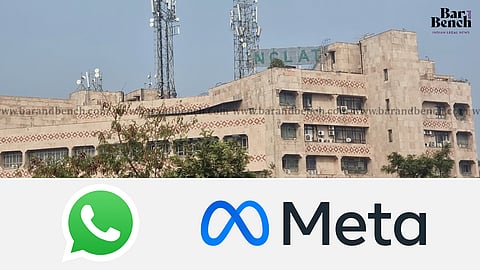
- Latest Legal News
- News
- Dealstreet
- Viewpoint
- Columns
- Interviews
- Law School
- Legal Jobs
- हिंदी
- ಕನ್ನಡ

The Competition Commission of India (CCI) on Tuesday told the National Company Law Appellate Tribunal (NCLAT) that Meta’s size, resources and integration of Facebook, Instagram, Messenger and WhatsApp places it far ahead of competitors, making WhatsApp the dominant force in India’s market for messaging apps. [Meta INC, WhatsApp v. CCI]
Senior Advocate Balbir Singh, appearing for CCI, submitted that no other player comes close in terms of user dependence, network effects and cross-platform synergy.
Singh argued that WhatsApp’s reach and daily engagement levels, reinforced by powerful network effects, ensure that users remain locked into the service. Even if consumers install multiple apps, activity remains concentrated on WhatsApp, since switching requires persuading entire networks of contacts to migrate, a hurdle few can overcome.
He added that integration across Meta’s ecosystem magnifies these effects, as data and functionalities are shared between services. This cross-platform advantage attracts advertisers, developers and businesses, reinforcing Meta’s lead. Smaller rivals such as Telegram and Signal, Singh said, have user bases too limited to dent WhatsApp’s grip on the market.
Building on this finding of dominance, Singh said that WhatsApp abused its position by imposing the 2021 privacy policy on a “take it or leave it” basis.
Notifications presented the revised terms as mandatory, creating what he described as a manufactured sense of urgency. Users, fearful of losing access to a vital communication tool, were left with little choice but to comply.
He also underlined that the 2021 policy removed the limited opt-out safeguard that had existed under the earlier framework. By stripping away this option, WhatsApp compelled even those who had previously rejected cross-platform data sharing to now accept it, effectively leaving no alternative for continued use.
According to Singh, the 2021 policy authorised broad and ambiguous data collection practices that far exceeded what was necessary to provide messaging services. These provisions allowed WhatsApp to gather information from individuals, businesses and third parties, and then integrate that data across Meta’s wider ecosystem. Singh described this as a textbook case of exploitative abuse.
He further stressed that Indian users were treated differently from their counterparts in the European Union, where individuals enjoyed stronger rights such as the ability to rectify or erase their data. The absence of similar protections in India demonstrated that WhatsApp had deliberately chosen to deny Indian consumers the same level of transparency and control, Singh said.
Countering the platform’s claim that the case belongs in the realm of data protection, Singh submitted that privacy is a recognised dimension of competition.
"In digital markets, where services are offered at no monetary cost, data itself becomes the price. A reduction in privacy is, therefore, equivalent to a decline in service quality."
He explained that competition law and data protection law serve complementary roles. Privacy law asks whether consent meets legal standards, while competition law examines whether dominant players are exploiting their position to impose unfair conditions and distort the market. To exclude privacy from competition analysis, Singh warned, would leave large parts of the digital economy unregulated.
In November 2024, the CCI imposed a ₹213.14 crore penalty on Meta, finding that WhatsApp’s 2021 privacy policy update amounted to abuse of dominance. The regulator concluded that the “take-it-or-leave-it” approach imposed unfair conditions on users, undermined autonomy and violated provisions of the Competition Act, 2002.
The CCI directed WhatsApp not to share user data with Meta or its affiliates for five years, and further required the platform to specify the purposes of every category of data collected and prohibit making data sharing a precondition for accessing its services in India.
WhatsApp and Meta challenged the order before the NCLAT. In January 2025, the NCLAT stayed both the penalty and the five-year data sharing ban, observing that such a ban could “lead to the collapse of the business model of WhatsApp LLC since the platform is free.” The penalty was stayed subject to WhatsApp/Meta depositing 50 per cent of the amount.
Earlier, Senior Advocates Kapil Sibal, Mukul Rohatgi, Arun Kathpalia and Amit Sibal had made submissions on behalf of Meta and WhatsApp.
Kathpalia is expected to make his rejoinder arguments on Thursday.